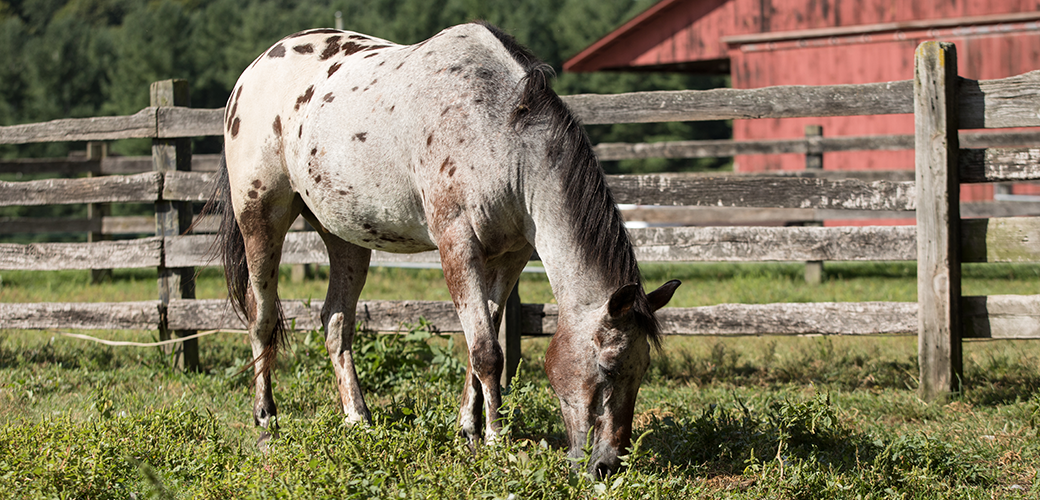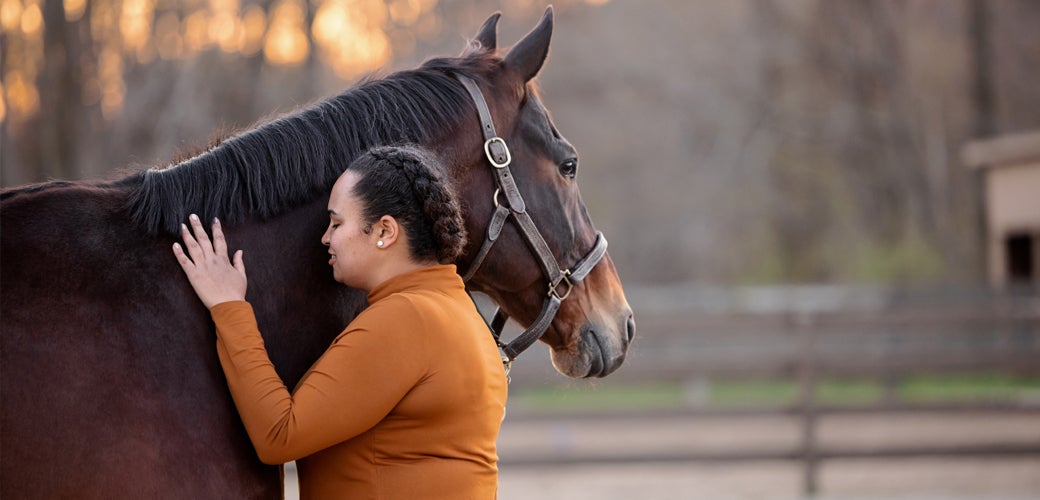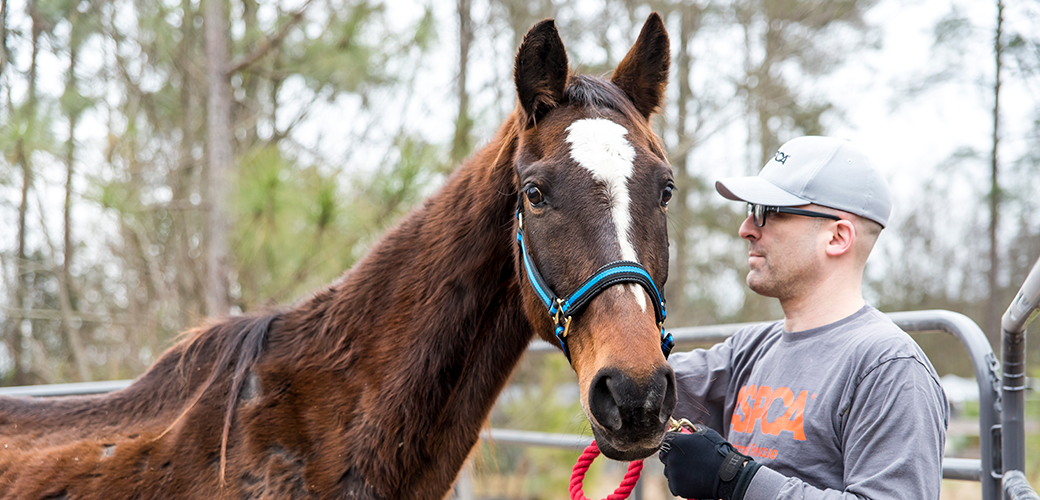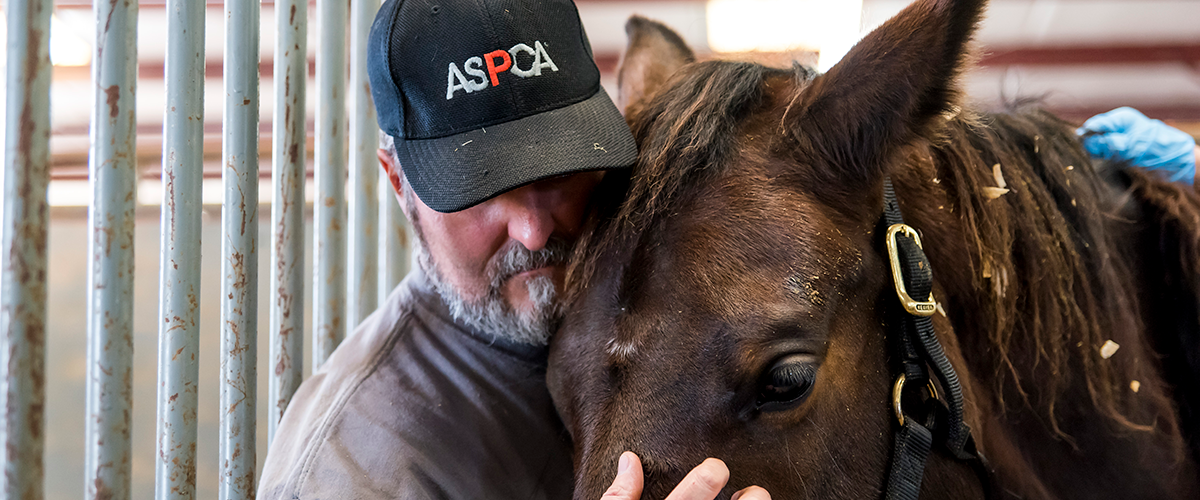
Our Multifaceted Work for Horses

Because the ASPCA is dedicated to ensuring good welfare for all equines, we’re building innovative programs to provide them with a unique, comprehensive network of support. Our strategy has four priorities: Keep horses safe, popularize equine adoption, fight cruelty, and respond to emergencies.
Keeping Horses Safe

When the guardian of a dog or cat needs to relinquish their pet, there are many safe places they can turn to. The ASPCA is working to develop similar options for horses; we want to ensure that there are high-quality, accessible rehoming and safety net programs available to horse owners who need them anywhere in the country. Without an option for safe surrender to a shelter or rescue, the horse’s welfare may suffer. Our equine safety net programs are designed to keep horses with their owners when that is what’s appropriate, or provide a safe place to await rehoming when needed. They also provide compassionate, humane end-of-life services.
We started the ASPCA Regional Support Center pilot near Dallas, Texas, in July 2018, and in 2019 we launched the second iteration in Oklahoma City, Oklahoma. The program offered assistance for owned equines in the surrounding areas. This included rehoming opportunities for horses, mules and donkeys, and basic veterinary care. The ASPCA Regional Support Center pilot positively impacted more than 300 horses.
By the end of 2021, the Regional Support Center evolved into the Equine Transition and Adoption Center pilot, which expanded its reach to supporting horses throughout the state of Oklahoma. The Equine Transition and Adoption Center pilot is aimed at developing solutions to the barriers to finding horses homes. The program provides adoption services throughout Oklahoma and includes a temporary physical location at a partner facility, Nexus Equine.
The learnings from the ASPCA Regional Support Center and the Equine Transition and Adoption Center have been shared with the sheltering community and used as a blueprint for similar programs. Through grants, the ASPCA has supported our network of Partners in expanding and launching their own open-admissions programs, broadening the network of support available to horses and their owners.
To prevent families from having to give up their equine companions for financial reasons, the ASPCA, in partnership with the American Association of Equine Practitioners, is collaborating with local veterinarians on The Vet Direct Safety Net pilot program. In this project, veterinarians identify and provide subsidized services to local horse owners who are experiencing hardship. Participating veterinarians provide up to $600 of free veterinary services per animal to perform emergency procedures or compassionate euthanasia.
Additionally, the ASPCA has funded the development of the American Horse Council’s microchip look-up tool, which enables care providers to identify microchipped horses and assist them through safety net programs, recover horses from theft and monitor their welfare. Microchips also reunite lost horses with their families in the aftermath of disasters.
Helping Horses Find Homes

While a significant percentage of dog and cat owners have obtained their pets through adoption, that’s not yet the case with the horse-owning community—and we’re working to change that. Our adoption-focused program, ASPCA Right Horse™, aims to dramatically increase horse adoption in the United States. It is a collaboration between the equine industry and animal welfare professionals to increase adoption outcomes, improve rehoming best practices and shine a national spotlight on equine adoption.
The ASPCA Right Horse program builds bridges between welfare and industry entities by uniting a large network of partner rescues and shelters around the country to engage the public and build programs that increase adoptions. Adoption groups who go through the process of becoming an ASPCA Right Horse Partner receive support and mentorship as they work to achieve a set of criteria around adopter engagement, nonprofit management and industry best practices. Groups who’ve successfully completed the process of becoming a Partner have reported a more than 100% average increase in their adoptions within the first year of partnership.
Once becoming a full ASPCA Right Horse Partner, they are eligible to receive exclusive resources and apply for our equine-focused grants. In 2021 alone, ASPCA Right Horse Partners received over $1 million in grant funding to support programs and initiatives to increase community support and grow their adoption programs. Partners also benefit from receiving cost-free access to our annual equine conference, product donations from our Industry Partners and ongoing support and education.
Simultaneous to our work with the equine welfare community, the ASPCA Right Horse program engages the public to bring awareness and interest to horse adoption. An ASPCA study estimated 1.2 million U.S. households—or approximately 2.3 million adults—have both the resources and desire to adopt an at-risk equine. Homeless horses are connected to potential adopters through an online adoption portal called My Right Horse. Recognizing that geography can be a significant barrier to making good matches, we launched the ASPCA Horse Adoption Express in 2021. The Horse Adoption Express moves horses between ASPCA Right Horse Partner organizations and trainers to prepare them for and connect them to adoptive homes.
Strengthening Legal Protections

Ensuring equines are protected under the law is vital to preventing cruelty and building a brighter future for them. Our policy work focuses on protecting wild horses and burros, ending horse slaughter and preventing a cruel practice called soring.
Wild horses and burros—living symbols of the American West who helped shape our nation’s heritage—have enjoyed special legal protections since the passage of the 1971 Wild Free-Roaming Horses and Burros Act. Unfortunately, the federal agency responsible for wild horse management has consistently blundered this duty. With wild horse populations rapidly growing, and threats of government culls and climate change looming, the ASPCA has stepped forward with a proposal to protect and humanely manage these special herds. Through fertility control, strategic gathering, rehoming of gathered horses and a focus on adoption, America’s wild horses and burros can continue to thrive on public lands for generations to come.
American horses have not been slaughtered for human consumption in the U.S. since 2007 because of overwhelming public opposition and a federal ban on funding it. However, a loophole in the law allows tens of thousands of our nation’s beloved equines to be transported across U.S. borders each year to be slaughtered. Fortunately, that may come to an end with the passing of the Save America’s Forgotten Equines (SAFE) Act—federal legislation that would prevent the horse slaughter industry from reestablishing operations in the U.S. and prohibit the export of American horses for slaughter. Time is running out to pass this bill; please urge your members of Congress to advance the SAFE Act.
Soring—the practice of using chains or chemical burns to injure a horse’s hooves and legs to elicit an exaggerated gait in the show ring—is pervasive in the breed-specific Tennessee Walking Horse Industry. Ending this abuse is essential, which is why the ASPCA supported passage of the federal Prevent All Soring Tactics (PAST) Act.
Combating Cruelty and Responding to Crises

The ASPCA has always been at the forefront of disaster response and cruelty intervention. Our National Field Response team has helped tens of thousands of animals, including horses and other equines, displaced by hurricanes, wildfires, mudslides and other disasters.
Federal, state and local authorities call on us to assist in animal cruelty cases, too. ASPCA team members deploy to lead investigations, collect forensic evidence, rescue animals and transport them to safety, shelter and care for the animals, and provide legal services to bring those responsible to justice.
